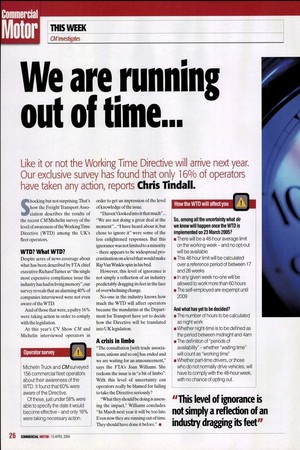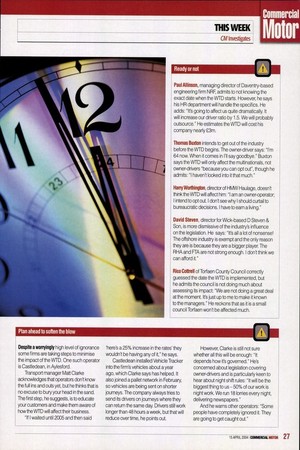We are running out of time...
Page 26

Page 27

If you've noticed an error in this article please click here to report it so we can fix it.
Like it or not the Working Time Directive will arrive next year. Our exclusive survey has found that only 16% of operators
have taken any action, reports Chris Tindall.
Shocking but not surprising.That's how the Freight Transport Association describes the results of the recent CM/Michelin survey of the level of awareness of the Working Time Directive (WTD) among the UK's fleet operators.
WTD? What WTD?
Despite acres of news coverage about what has been described by FTA chief executive Richard Turner as "the single most expensive compliance issue the industry has had in living memory", our survey reveals that an alarming 40% of companies interviewed were not even aware of the WTD.
And of those that were, a paltry 16% were taking action in order to comply with the legislation. At this year's CV Show CM and Michelin interviewed operators in
order to get an impression of the level of knowledge of the issue.
"I haven't looked into it that much"... "We are not doing a great deal at the moment"... "I have heard about it, but chose to ignore it" were some of the less enlightened responses. But this ignorance was not limited to a minority — there appears to be widespread procrastination on a level that would make Rip Van Winkle spin in his bed.
However, this level of ignorance is not simply a reflection of an industry predictably dragging its feet in the face of overwhelming change.
No-one in the industry knows how much the WTD will affect operators because the mandarins at the Department for Transport have yet to decide how the Directive will be translated into UK legislation. A crisis in limbo
"The consultation [with trade associations, unions and so on] has ended and we are waiting for an announcement," says the FTA's Joan Williams. She reckons the issue is in "a bit of limbo". With this level of uncertainty can operators really be blamed for failing to take the Directive seriously? "What they should be doing is assessing the impact," Williams concludes. "In March next year it will be too late. Even now they are running out of time. They should have done it before." •
Operator survey
Michelin Truck and CMsurveyed 156 commercial fleet operators about their awareness of the VVTD. It found that 60% were aware of the Directive.
Of these, just under 58% were able to specify the date it would become effective and only 16% were taking necessary action.
How the WTD will affect you
So, among all the uncertainty what do we know will happen oncethe WTD is implemented on 23 March 2005? • There will be a 48-hour average limit on the working weekand no opt-out will be available • This 48 hour limit will be calculated over a reference period of between 17 and 26 weeks • In any given week no-one will be allowed to work more than 60 hours • The self-employed are expempt until 2009
And what has yet to be decided? The number of hours to be calculated as night work • Whether night-time is to be defined as the period between midnight and 4am • The definition of "periods of availability" -whether "waiting time" will count as "working time"
• Whether part-time drivers, or those who do not normally drive vehicles, will have to comply with the 48-hour week, with no chance of opting out.
Paul Allinson, managing director of Daventry-based engineering firm NRF, admits to not knowing the exact date when the VVTD starts. However, he says his HR department will handle the specifics. He adds: "It's going to affect us quite dramatically. It will increase our driver ratio by 1.5. We will probably outsource." He estimates the VVTD will cost his company nearly E3m.
Thomas Buxton intends to get out of the industry before the VVTD begins. The owner-driver says: "I'm 64 now. When it comes in I'll say goodbye." Buxton says the VVTD will only affect the multinationals, not owner-drivers "because you can opt out", though he admits: "I haven't looked into it that much."
Harty Worthington, director of HMW Haulage, doesn't think the VVTD will affect him: "I am an owner-operator; I intend to opt out. I don't see why I should curtail to bureaucratic decisions. I have to earn a living."
David Steven, director for Wick-based D Steven & Son, is more dismissive of the industry's influence on the legislation. He says: "It's all a lot of nonsense! The offshore industry is exempt and the only reason they are is because they are a bigger player. The RHA and FTA are not strong enough. I don't think we can afford it."
Rico Cottrell of Torfaen County Council correctly guessed the date the VVTD is implemented, but he admits the council is not doing much about assessing its impact: "We are not doing a great deal at the moment. It's just up to me to make it known to the managers." He reckons that as it is a small council Torfaen won't be affected much.
Plan ahead to soften the blow
Despite a worryingly high level of ignorance some firms are taking steps to minimise the impact of the VVTD. One such operator is Castledean, in Aylesford.
Transport manager Matt Clarke acknowledges that operators don't know the full ins and outs yet, but he thinks that is no excuse to bury your head in the sand. The first step, he suggests, is to educate your customers and make them aware of how the VVTD will affect their business. "If I waited until 2005 and then said
'here's a 25% increase in the rates' they wouldn't be having any of it," he says.
Castledean installed Vehicle Tracker into the firm's vehicles about a year ago, which Clarke says has helped. It also joined a pallet network in February, so vehicles are being sent on shorter journeys. The company always tries to send its drivers on journeys where they can return the same day. Drivers still work longer than 48 hours a week, but that will reduce overtime, he points out.
However, Clarke is still not sure whether all this will be enough: "It depends how it's governed." He's concerned about legislation covering owner-drivers and is particularly keen to hear about night shift rules: "It will be the biggest thing to us — 50% of our work is night work. We run 18 lorries every night, delivering newspapers."
And he warns other operators: "Some people have completely ignored it. They are going to get caught out."
























































































































































































